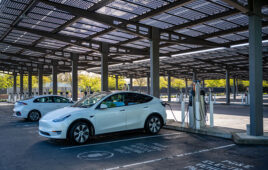In an era of unprecedented federal support for U.S. solar installation, the residential PV market has encountered economic hardships and policy roadblocks resulting in a rash of closures among contractors. Commercial solar warranter SolarInsure reported that there were more than 100 bankruptcies and closures in 2023 alone, including several large installers that were operating nationally or in multiple states.
While large-scale solar is carrying the country to another record-breaking year for overall installation, the residential market is struggling to stay afloat. Smaller contractors are navigating higher interest rates for project financing, soft costs for projects are mounting and a utility policy shift in California, the country’s leading solar state, is devastating its once thriving residential market.
The California Solar & Storage Association (CALSSA) reported that California has lost 17,000 solar jobs since April 2023, when the California Public Utilities Commission (CPUC) implemented updates to its net-metering policy. Policymakers said NEM 3.0 was devised to encourage more energy storage adoption on solar projects to provide more resilience to California’s electrical grid. Instead, it has reworked its net-metering system based on an hour-by-hour time-of-use rate that has cut energy export compensation by 70 to 80%.
The state was expected to lose 22% of its solar workforce by the end of 2023 because of it.
“I don’t even recognize my home state,” said Bernadette del Chiaro, executive director of CALSSA. “This is not California. This is not who we are. This is not how we have traditionally done things for 20 years. We have been, really, the prime example of how to do policy well, how to make long-term investments that provide certainty for industry and consumers alike.”
Industry analyst Wood Mackenzie predicted in January 2022 that the NEM 3.0 updates could cut California’s residential solar market in half by 2024. CALSSA advocated against the net-metering shift, predicting a similar outcome for the California market. Now, its residential installers are considering their options as this new net-metering regime reduces the number of homeowners able to afford a solar project.
“There’s always cycles, there’s always hurdles and curves down the road, but nothing like this. Nothing. This is a brick wall that got put in front of us,” said Carlos Beccar, marketing director of Energy Concepts, a residential solar installer in Fresno.
Energy Concepts has installed solar technologies since its founding in 1992, starting with thermal solar water heaters and transitioning to PV 15 years ago. In 2023, the company laid off 50% of its employees, citing NEM 3.0 as the primary cause. Energy Concepts’ installation numbers have reduced to about 25% of where it was in 2022, and that includes some of the projects the company sold as customers rushed to be included in NEM 2.0.
“2024 is starting to look very grim in terms of projections … We think that the industry is going to probably pick back up a little bit. But it’s hard to say,” Beccar said. “I don’t think the rebound is going to bring us anywhere near where we were last year or this year [2023], even.”
CALSSA surveyed its residential installer members and found that the companies staying in business have diversified and leaned on other internal services like roofing, mostly ceasing solar installation. Other contractors are leaving California entirely for states with friendlier solar policy. Energy Concepts is now bidding on projects left behind by contractors that have fled the state.
These company closures will also result in orphaned solar systems for customers. Fulfilling warranties and performing maintenance on abandoned solar arrays is an existing and complicated issue within the industry that could increase as more contractors close their doors.
“We’ve seen this happen before, but never at the scale that we’re about to see,” del Chiaro said. “It’s a huge problem. Hopefully their systems are interconnected and energized and nothing goes wrong, and if something does go wrong, the manufacturer steps in and honors the warranty. But there are going to be a lot of customers that are left hanging because their project never got built, or they’re going to struggle if something goes wrong.”
Since California was a trailblazing state for solar installation, it has been a testbed for renewable energy policies, and del Chiaro said legislators in other states are already citing NEM 3.0 as rationale for limiting net metering.
“For them to use this excuse, this moment, to get rid of their net-metering policy is just ridiculous, but it’s also unfortunately something that we also warned California lawmakers about — not that they should make California policy decisions with other states in mind, but that they need to be aware that their leadership works both ways,” del Chiaro said.
This past summer, the compensation rate for net metering in Indiana dropped by 70%, phasing out from a policy passed in 2017, according to The Herald Bulletin. Southeast utility Duke Energy is implementing a net-metering plan with similar language to NEM 3.0 in North Carolina, compensating commercial customers for the “value of electricity at that time,” according to NPR station WFAE 90.7.
But the net-metering saga in California continues. The CPUC passed a policy in November that will change how properties with multiple electric meters are compensated for energy exports. Solar built on schools, apartment buildings and other multi-metered properties will no longer directly offset utility bills. Instead that energy will be sold to utilities at lower rates, according to a CALSSA press release.
“It’s incredibly ironic as California policymakers travel the globe, touting California’s climate leadership, that we’re in such dark times in California — the hotbed of solar,” del Chiaro said. “We’re in these incredibly dark times and the damage is starting to spread across the country.”
This story is part of SPW’s 2024 Trends in Solar. Read all of this year’s trends here.






Necessity is the mother of invention. Maybe it’s time to improve how we do solar? At Solvari we have standardized and pre-engineered an all in one solar panel, which eliminates a lot of the workload and overhead thereby enabling solar companies to operate more profitability with less labor and less risk. One of the challenges with so many independent installers and solar vendors is the complexity of the design of solar systems, which leads to the potential warranty and maintenance risk listed in this article. By contrast standardizing on equipment, across millions of installations will make all of that a lot easier. In addition installers that use Solvari are able to install two houses per day with the same crew which doubles revenue without increasing expenses.
When an industry’s success depends on government subsidies, it’s doomed to fail.
Interestingly, fossil fuels have enjoyed massive subsidies for decades and decades, and even now enjoy much larger subsidies globally than renewables do…..
Yep, every time somebody says “energy security” they mean “fossil fuel subsidies”. Just look at the amount of money poured into the unprofitable mess that is fracking.
I agree with you, Gary. Most government policies don’t make much economic sense for the man on the street. As long as politicians are running around worrying mostly about their popularity, things will be going sideways in this world and all the goodwill of the regular citizen will be in vain. Here in Canada we unfortunately face the same problem. Governments have always given preferential treatment to large businesses even though small and medium-sized businesses (statistically proven) create the majority of the jobs.
The federal government is backing solar completely and trying to help it grow. Who is responsible for this decline in solar on the state level. Is it the utilities that don’t want to do net metering any longer? In Florida we have seen the largest utility Florida Power and Light try to get out of doing net metering every year. It had to be vetoed by our governor. When the utilities finally do get rid of net metering will we be able to install solar systems with batteries without these customers being forced to be on the grid? Will we as a contractor still be forced to get Letters of Intent and permits to install solar systems if they are not on the grid. We would like to start installing solar systems with zero export to the grid. If the utilities don’t want to do net metering there is no reason for the solar customer to give them free electricity. How can we start selling solar systems and batteries to people that want to be off the grid and do this legally. Do we just start doing it? The utilities are trying to put solar contractors out of business. Who is behind this? Is it a certain political group? Is this just all about money? Can the federal government step in and demand utilities to do net metering? How did this even happen in California of all places? This is slowing sales and putting good companies out of business. There are also a bunch of scam solar companies and marketers that will fall by the wayside. These scam solar companies have not helped the situation. Please let me know your thoughts on these issues.
Yes, Off grid works in many areas. Off Grid will be more Costly due to sizing since the grid no longer picks up consumption/production gaps. Solar paired w/ Battery is still an electrical home improvement, so would still require AHJ approval & most likely electrical permits. AHJ will also make sure home is still functional from a Health & Safety standpoint. Think heat & hot water when there are clouds for weeks. If using propane, can the tanks be a safe distance from structures on subject & neighbors lot. Cheers. AJT, Energy Analyst GHS
Hello Billy,
Tyler Dean with Nerd Power (Solar installer in AZ CA TX NV). We’d love to share our success story with you and our growth in 2023 and now mergers and acquisitions in 2024. Solar is strong and we believe we have a recipe others in the industry can follow and would love it if someone like you could help us get that word out.
Thank you in advance. Hope to meet soon.
Tyler Dean
Learning & Development Director
Nerd Power